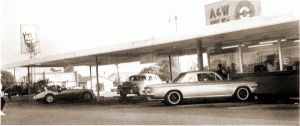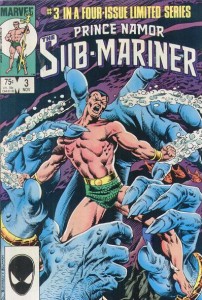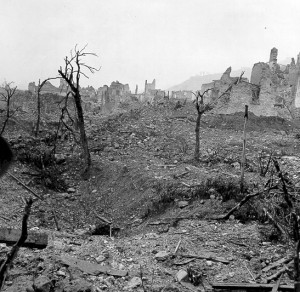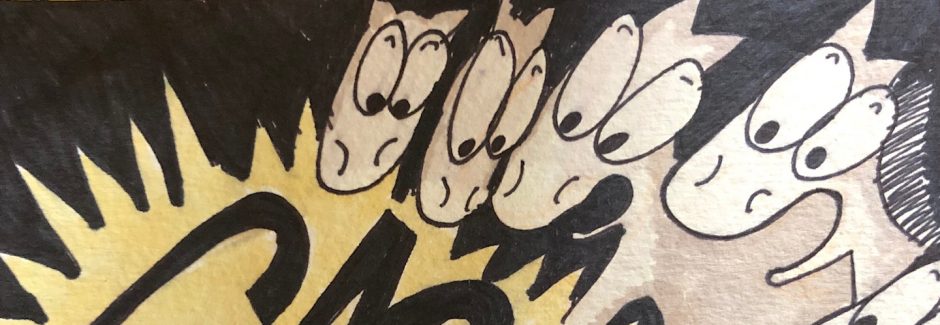Esquimalt News, November, 2004
 The best part of summer when I was a kid were the trips we’d take to visit my mom’s brother, Jim and his family, in Kamloops. As soon as Uncle Jim came in the door from work, he’d gather up a couple of the kids and we’d head down to A&W to get a jug of root beer – remember the big glass gallon jugs? It would signal the start of a 3 day festival of sitting in the back yard after supper, belching and spitting watermelon seeds.
The best part of summer when I was a kid were the trips we’d take to visit my mom’s brother, Jim and his family, in Kamloops. As soon as Uncle Jim came in the door from work, he’d gather up a couple of the kids and we’d head down to A&W to get a jug of root beer – remember the big glass gallon jugs? It would signal the start of a 3 day festival of sitting in the back yard after supper, belching and spitting watermelon seeds.
During those blistering hot days in the heartland, cousin Jimmie and I would retreat to the basement to work our way through Junior’s amazing collection of comic books. That’s where I developed my affection for obscure superheroes like the Green Lantern and Namor the Sub-Mariner.
the basement to work our way through Junior’s amazing collection of comic books. That’s where I developed my affection for obscure superheroes like the Green Lantern and Namor the Sub-Mariner.
Uncle Jim was the complete opposite of every stereotype that exists about accountants. He loved to tell jokes and laugh. Gregarious, outgoing, he was active in the community and had the gift of making people feel like old friends five minutes after shaking hands for the first time. Once the business of the day was concluded, he would retire to the bosom of his family: a rye and ginger within easy reach and Sandy, the Cocker Spaniel, at his feet.
One afternoon, during a Sgt. Fury marathon, my cousin pointed to the guns being held by the evil gestapo and said, “my dad has a Luger.” I giggled, “everybody has boogers”. I wish I’d never said that. There have been many times in my life I have been made to feel like a fool and having three cousins plus my big sister pointing and laughing was indeed memorable. When the grown-ups found out what all that laughing was about…well, it took the offer of letting me ride shot-gun for a root beer run before even Uncle Jim could coax me out from behind the hide-a-bed.
When we got back and had poured ourselves a few frosty mugs, Uncle Jim brought out something wrapped in canvass. Carefully he unwrapped it and held it up so I could see it.  A real German Luger. In true Uncle Jim style he told a long story that involved a bar near the front lines, sneaking back after curfew, a german soldier on patrol and a bottle of wine.
A real German Luger. In true Uncle Jim style he told a long story that involved a bar near the front lines, sneaking back after curfew, a german soldier on patrol and a bottle of wine.
That was Uncle Jim. I know that isn’t the way you get a gun off an enemy soldier but I still want to believe if anyone could walk away from a situation like that with a german gun in his pocket instead of a bullet in his back, it would be Uncle Jim. Over the years I’ve also come to realize that these stories were his way of not talking about the war.
He would brag about his silver lined esophagus, the result of an emergency procedure a battlefield surgeon performed to save his life. “Now that man,” he’d say, “That doctor was a real war hero.” He never talked about how he ended up needing the services of the doctor. The topic would change and another story would start before we could get any more details.
 I never found out exactly what happened to Uncle Jim until years after he’d died. Another of mom’s brothers, Lionel, told me Jim won his silver prize when he was fighting in the blood soaked mud of the nightmare known as the Scheldt and a truck fell over crushing him into the mire.
I never found out exactly what happened to Uncle Jim until years after he’d died. Another of mom’s brothers, Lionel, told me Jim won his silver prize when he was fighting in the blood soaked mud of the nightmare known as the Scheldt and a truck fell over crushing him into the mire.
Lionel wasn’t at the Normandy landing or the liberation of Holland. Talking about Jim’s experiences was Lionel’s way of not talking about Sicily, Ortona and Monte Casinno. Or what it felt like to be called a D-Day Dodger after endless days and nights at the front lines, dragging the wounded to safety under constant shell fire. The endless days of burying the  dead, the boys he’d signed up with in Calgary and trained with in Britain.
dead, the boys he’d signed up with in Calgary and trained with in Britain.
When I told him I was going on a trip to Europe, Lionel joked about having spent a few years there courtesy of the Canadian government. He talked about the time he took his wife over to show her where he’d been. Joked about how he’d spent all those years with nothing more than a government issue uniform and a blanket but for a couple of weeks with ‘the wife’ he needed to rent a car for all her luggage.
I’ve never even asked what he thinks of movies like “Private Ryan”. I know the Hollywood story is how the Yanks won the war and how the Brits merely bumbled around getting in their way. I know the Brits thought of Canadian and Australian troops as a good way to use up enemy ammunition. And how surprised everyone was when the Aussies or the Canucks broke through those impenetrable lines and finished the job without mother’s help.
around getting in their way. I know the Brits thought of Canadian and Australian troops as a good way to use up enemy ammunition. And how surprised everyone was when the Aussies or the Canucks broke through those impenetrable lines and finished the job without mother’s help.
I doubt they’ll ever make a movie about Namor the Sub-Mariner or the Green Lantern like they have about Superman or the Fab Four. That’s okay. I know they’re just pictures in a comic book. It’s the people who don’t want to talk about their story, who have damn  good reasons for not wanting to go through those memories again, who are the real heroes.
good reasons for not wanting to go through those memories again, who are the real heroes.


2 Responses to Learning to listen between the lines